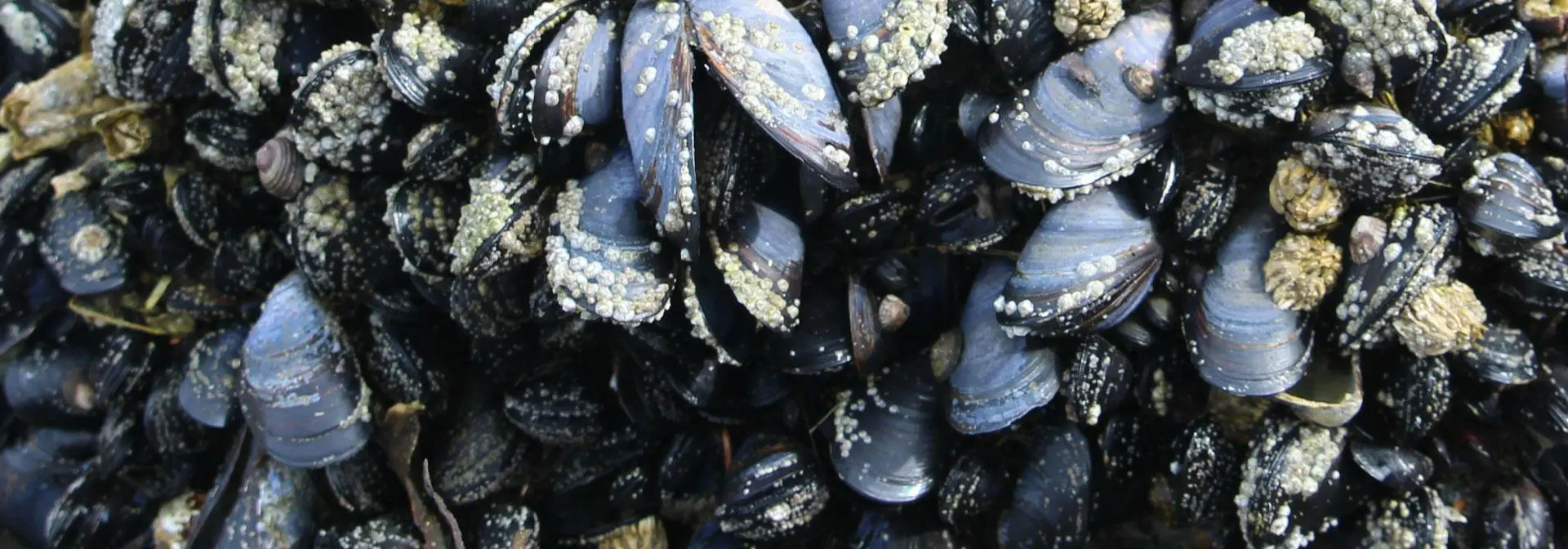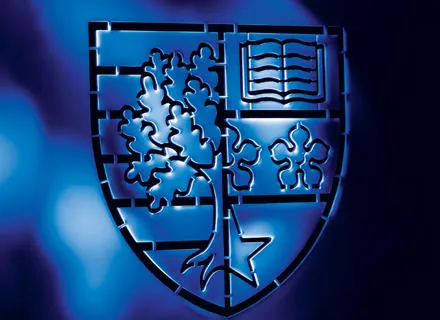Key information
This project aims to fill knowledge gaps around the factors which have led to the decline of blue mussels in the NE Atlantic area and more specifically in Scotland and the UK.
- Funding
- Competition funded (Students worldwide)
- School
- Energy, Geoscience, Infrastructure and Society
- Location
- Edinburgh
- Award
- PhD
- Delivery type
- Full-time
- Supervisor
- Alastair Robert Lyndon
- Closing date
- Friday, 9 January 2026
- Duration
- 44 months
This project is part of the NERC-funded Centre for Doctoral Training, ECOWILD.
For more details, and for a full list of projects offered under this programme, please visit: https://ecowild.site.hw.ac.uk/
Project Description
This project aims to fill knowledge gaps around the factors which have led to the decline of blue mussels in the NE Atlantic area and more specifically in Scotland and the UK. The role of simultaneous multiple stressors will be assessed from historical data and tested by using in situ (field) and laboratory analyses of wild and reseeded mussels. This addresses questions around the persistence, resilience and dynamism of natural mussel populations and habitats (sedimentary beds versus rocky shores), as well as informing best practice for prediction of optimal locations for restoration efforts, which are increasingly being undertaken to enhance ecosystem services (water filtration, prey provision), biodiversity and human food security.
The student would be involved in mussel surveys (including coordination with community group partners), mapping, historical data collation and analysis, mussel health evaluation (e.g. bacteria; parasites), tissue analyses and exposure to selected multistressors. Ground-truthing of field sites would also be done in order to predict conditions for use in the lab and also to select sites best suited to restoration efforts. GIS will be use to map locations where this work will take place and to evaluate proposed approaches.
The student would be part of a wide group of wetland and marine students at Heriot-Watt (across the Institute of Life & Earth Sciences and The Lyell Centre) and UHI (SAMS). Opportunities for academic career development such as demonstrating to undergraduate and postgraduate classes and attendance at meetings and conferences would be strongly encouraged.
What do you need to know
Blue mussels are declining globally despite previously being ubiquitous and abundant in marine shore habitats. Reasons for decline are likely multi-factorial, hence the focus here on multi-stressors, including physical disturbance, harvesting, predation, disease, contaminants and climate change. Populations in close proximity can vary in health, but larval production often remains good, enabling juvenile collection and planting out in threatened areas. This will allow testing of reasons for observed impacts and effective restoration. The supervisory team draws together key skills giving a new perspective on this topic, combining unique expertise in mussel distribution patterns, population trends and community engagement (HWU; SAMS UHI), population survey, conservation and restoration licencing (NS), stressor impact measurement (HWU), analytical chemical analysis (HWU Lyell) and in-vivo toxicity testing (Astra-Zeneca).
What expertise and skills will the student develop?
Work involved will include testing of different approaches for spat capture and redeployment, analysis of source and receiving environmental variables (chemicals, physical variables, habitat features), analysis of body condition and disease status and coordination with community groups in relation to surveying, collection and redeployment of mussels. Skills to be developed will include mussel collection and husbandry, field measurements of biotic and abiotic stressors, chemical analytical techniques, statistical analyses, GIS mapping, networking and communication with agency and stakeholder groups.
Why is the project novel?
There is much data on individual contaminant levels in blue mussels, this species having been a standard biomonitoring species for several decades. Paradoxically, this information hasn’t been applied to mussel population health assessment. This project will use existing information to provide baselines for focussed studies on relevant stressor combinations. Other novel aspects include using historical archive and community records to identify mussel restoration areas, coordination of community groups to oversee survey and restoration and integration new restoration techniques with time-series health monitoring and chemical status of reseeded mussels. The combination of expertise in mussel population assessment, distribution mapping (HWU, SAMS), community survey coordination and engagement (HWU, NS), ecotoxicology (HWU, SAMS, Astra-Zeneca) and restoration (HWU, NS) provides a unique blend of relevant experience.
What real-life challenge does it address?
Blue mussels have shown a dramatic recent decline in abundance across their range for which reasons are unknown. Mussels provide key ecological roles as water filters and sediment depositors, linking the water column with the seabed. They are also a key prey species for crustaceans and birds and provide a food source for humans. Understanding reasons for changes in mussel abundance and distribution is essential to design and develop successful restoration efforts, so as to optimise conservation efforts and to inform assessment of increased risks to ecosystem function and human food security.
Timelines
The closing date for applications is 17:00 BST Friday 9 January 2026, and applicants must be available to start in October 2026.
Project supervisor
Lead Supervisor: Alistair Lyndon (Heriot Watt University)
Stakeholder Supervisor: Carol Hume (NatureScot)
Co-Supervisor 1: Alasdair O’Dell (University of the Highlands and Islands/ Scottish Association for Marine Science)
Co-Supervisor 2: Mark Hartl (Heriot Watt University)
Co-Supervisor 3: Clayton Magill (Heriot Watt University)
Co-Supervisor 4: Stewart Owen (Astra-Zeneca)
For more information on how to apply, please visit the ECOWILD website.
Project specific enquiries: a.r.lyndon@hw.ac.uk, General enquiries: ecowild@hw.ac.uk.
Entry requirements
Candidate criteria
Eligibility
This project is available to home and overseas students. International candidates may apply but if successful, will need to demonstrate that they (or their supervisory team) have co-funding to cover the difference between home and international fees to be eligible. The difference in fees varies by programme. The current difference for 2025/26 academic year is approximately £20,000 per year.
Applicants typically should have a first or upper second-class honours degree or equivalent in an appropriate subject and preferably a relevant Masters’ qualification or similar experience.
We recognise that not every talented researcher will have had the same opportunities to advance their careers. We therefore will account for any particular circumstances that applicants disclose (e.g. parental leave, caring duties, part-time jobs to support studies, disabilities etc.) to ensure an inclusive and fair recruitment process.
Additional information
Essential Skills:
- Field-based skills
- Laboratory skills
- Data analysis
English language requirements
If your first language is not English, we'll need to see evidence of your English language ability.
The minimum English language requirement for entry to this programme is IELTS 6.5 (or equivalent) with no score lower than 6.0.
If you do not have IELTS 6.5, we offer a range of English language courses to help you meet the English language requirement for this programme prior to commencing your studies.
For more information about your application and our English Language requirements, please see Section 10 of our page on English Language Requirements as part of your application.
Funding information
This is a full scholarship which will cover tuition fees for Home students and provide an annual stipend in line with UKRI recommended levels (currently £20,780 in 2025-26) for the 44 months duration of the project.
International candidates may apply but if successful, will need to demonstrate that they (or their supervisory team) have co-funding to cover the difference between home and international fees to be eligible. The difference in fees varies by programme. The current difference for 2025/26 academic year is approximately £20,000 per year.
Why Heriot-Watt
We're the top university in Scotland for graduate outcomes which means that more of our graduates are employed or in postgraduate education than any other institution in the country and we ranked 5th in the UK.
We're also rated number one in the UK for CEO or MD roles, meaning more of our graduates go on to become CEOs or MDs than any other university in the whole of the UK. On top of that, we have beautiful campuses, across the globe, so you'll get a truly international education. Our Edinburgh Campus is home to Oriam, Scotland's National Sports Performance Centre combined with plenty of wellbeing resources, prioritising fitness and mental health for all students. Our Global Research Institutes look at solving real world issues such as climate change and saving our oceans as well as working on the next medical technological breakthrough and the future of AI and robots.

